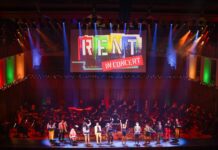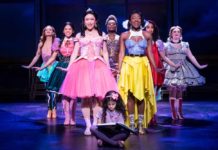Welcome to the conversation and The Playwright’s Playground, an in-depth conversation with female playwrights in the D.C. theatre community. Female theatre artists make up more than 50 percent of those involved in the theatre, yet the number of female playwrights being produced is dramatically lower. In this continuing Interview Series, I’ll introduce DCMTA readers to the many talented playwrights in the DMV area to learn about their writing process, their inspirations, and the motivations and struggles to write and produce their art.
In this special edition, I am overjoyed to feature the ten female playwrights of Source Festival 2014. Led by the Artistic Direction ofThe Playwright’s Playground Source Festival 2014 is a three-week performing arts project of CulturalDC that cultivates new work in a nurturing environment and spotlights the witty, incisive, and thought-provoking writing from today’s emerging American playwrights. Building the path for the next generation of outstanding performing artists, The Source Theatre Festival (June 7-29) presents three themed full-length plays (Mortality, Revenge, Quests), three experimental Artistic Blind Dates of created original work, and three thematically grouped programs with six 10-Minute related plays to enjoy.
Erin Bregman
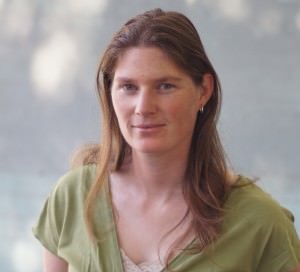
Headlining the Mortality theme at this year’s Source Festival 2014 is Erin Bregman’s Play A Bid to Save the World. This fully staged premier is one of the three full-length plays selected from more than 120 scripts submitted to the Festival by invitation.
Erin Bregman was born in Santa Cruz, and has lived along the north coast of California ever since. She is a current resident playwright at the Playwrights Foundation and PlayGround, and a company member of Just Theater and 2H4. Erin has been a multi-year finalist for the Princess Grace Award, the Jerome Fellowship, and Aurora’s Global Age Project, and is the founder and Artistic Director of Little Opera, an all-kids opera company.
___________
Sydney-Chanele: Why do you write, and more specifically, ‘Why do you write plays?
Erin: ‘Why do I write?’ and ‘why do I write plays?’ are actually two questions I’ve been asking myself a lot recently, and I’m not sure I’ll ever find a simple answer to either one.
Some days I write because I have a deadline to meet, and someone is expecting me to come up with a new draft or X number of new pages, so I’d better sit down and do it (and soon!). Some days I write because I’ve written it into my schedule, and want to honor that. Other days I write (or more specifically, re-write) because I’m about to share a draft of something with artists I admire, and want to make sure all the ideas I’ve got down are the best ones I can come up with to date. Though I hate to admit it, I almost never write because I’m inspired to. At least, that’s not why I sit down to write. I may spend more time than I planned working on something because new ideas keep coming, but the act of sitting down to write in the first place is nearly always an act of work, not inspiration.
Why do you write plays?
I write plays today to try and create some of the magic that drew me to theater in the first place. I grew up going to see Shakespeare Santa Cruz productions every year, and I remember, as a kid, seeing their Wind in the Willows. There was this moment when Ratty and Mole are onstage rowing around in a boat, and it looked exactly like they were actually rowing on water, even though I knew the boat was rolling around on wheels I couldn’t see, and the actors were moving themselves around with their feet. But the illusion of rowing across water was absolutely perfect, and I was blown away. I write plays to try and create moments like that, moments that transcend what we logically know is happening right in front of us and take us straight into another kind of reality.
What is your writing process?
The routine and setting for how I write have changed with almost every project, but there are a few things that I would consider to be consistent enough to call part of my writing process:
I have a hard time writing when there’s music playing, especially if that music includes sung words in English. I inevitably find myself so distracted by listening that I’m unable to hear my own thoughts. For this reason, I tend to do most of my writing either at home (at the kitchen table if I have to spread out, or at a small old writing desk that was my grandmother’s if I’m not spread out) or at a café in San Francisco called Borderlands.
I prefer writing by hand than writing on the computer. For first drafts, it’s simply because the computer is too distracting. It’s way too easy to stop mid-scene to look something up on wikipedia, or wander off to check my email when I get stuck on something rather than sitting tight and think it through, When I’m re-writing, I also find it’s really important for me to see what I’ve crossed out, and using a pencil and paper is the easiest way to do that. ‘Track changes’ just doesn’t do it for me. I find it to be much easier to choose between multiple handwritten versions crossed out and modified than different colors of text on a screen. All that said, when I do get into the computer, I use a program called Scrivner. It’s brilliant.
Does writing plays or working at your artistic endeavor pay the bills, or do you work another job to make ends meet?
Writing plays definitely doesn’t pay the bills, and it’s far from my main goal to have it do so. I’ve done a number of different things for an income, and at the moment I have my favorite set-up to date. I’m working very part-time (about 10 hours per week) for a fantastic start-up called Jhana Education as a writer. My other huge job is Little Opera, an organization that I’m founder and Artistic Director. (We make operas with kids. It’s pretty awesome.) Actually, that doesn’t pay the bills at the moment either, but it’s a huge part of how I spend my time and energy, and will probably start helping me make rent before playwriting does.
Source Festival Play
What are the plot and themes of your play this year in the Source Festival?
A Bid to Save the World is a play with several different stories in a few different worlds that all tie together by the end of the play. In one world is a sister whose brother has just died. In another are two teenagers living in a world where nobody dies anymore, at work in a library trying to figure out how to dies. In another, a story is told about a singer who sings a song that catches on and spreads around the world. At one point, we meet death. Death is a woman who sits and peels oranges. And when your orange is peeled, you are gone. There is a chorus that sings some songs, and hopefully some very funny bits sprinkled in throughout.
One of the major themes of the play is what we gain by having death, and what would be lost if it were not part of the human experience. Most of my writing so far always comes back to death sooner or later, and this time I wanted to write something on the subject that wasn’t depressing at all. Hopefully I’ve succeeded in that!
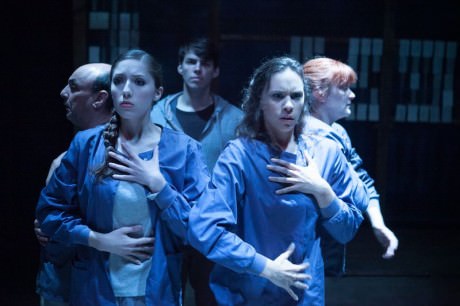
What has been your participation with the production we will see during the Festival?
In March, the Source Festival brought the writers, directors, and teams together to meet and read through the play. I’ve been really lucky to have a partnership with the Inkwell to develop this script, and that partnership has continued into the production at Source Festival. They were able to bring me out again in late May for an early stumble through of the piece. That was the only rehearsal I was able to be at, but in the three or four days following, I did a fair amount of rewriting of the script, and those rewrites turned into the production draft for Source.
What has been your biggest challenge with this script? How did you come up with the idea for it?
This script has been a beast to work on. There are a lot of moving parts to it, and figuring out how to make everyone’s stories as clear and as connected as possible has been a huge challenge. I don’t think it’s completely there yet, but it’s getting close!
The script came out of a ten-minute play that I wrote for a group in Berkeley called PlayGround. PlayGround gives prompts for playwrights to create pieces off of, and one month the prompt was Arlequin. I didn’t know anything about commedia del arte, so instead of doing a lot of research I just wrote this story-telling play that seemed like it could be over the top and ridiculous in a way that I imagined that style of theater to be. Playground commissioned a full-length of the ten-minute, and when I couldn’t figure out how to extend it, I decided to write a play around it. That original piece is the storybook story that we hear in pieces throughout the play. Where everything else came from, I’ll never know.
What was the time period between conception and what we will see on stage?
I have to look in my ‘bid to save the world’ folder to check and see.
It looks like the first iteration of this play was finished in early February 2011. I stopped counting drafts a long time ago, but it looks like there are 21 different dated versions of it. So, a lot of drafts! And the rewriting isn’t quite over yet.
What do you like most about this script and has it ever been performed on stage before?
The play has never before been performed onstage. There have been a good number of readings, but that’s never going to be the same as how things will look in a performance. I really like the music in this play. I think it works well as a way to set mood, tone, and move story forward in a different way. Right now, it’s my favorite part.
A Deeper Look & Inspirations
What is your all-time favorite play? And, who is your favorite living female playwright that you’d recommend to others or would like to see performed in the DC area?
That’s easy: Who’s Afraid of Virginia Woolf? It’s such a perfectly made play, and even though I’ve read it and seen it half a dozen times or more, each time there’s something new. I love that play. My favorite living playwright is Naomi Wallace. Her work is spectacular.
What are your thoughts about the disproportionate number of female playwrights consistently being programmed by theatre companies?
It sucks. Like most people out there, I’m completely baffled by why it’s so very disproportionate, especially knowing who out there is writing and the quality of the stuff they’re turning out. It seems like this is a very big conversation at a lot of theaters right now, so hopefully that will be followed by a serious shift. But for now, it just sucks.
Erin, How have you been able to get your work produced?
I think, like any playwright, getting productions is the hardest. I’m still very much learning how that happens, and won’t pretend to know how something goes from development into a season at most theaters. I tend to write big plays, either in cast size or scope or general ambition, so I’ve had theaters do a reading, love it, but then not feel like they can really take the play on. It was so exciting for me that Source Festival said yes to this play, especially since it’s probably the biggest, most complicated one I’ve written yet.
What inspires you to continue, and who are your playwriting inspirations?
Seeing really, really good theater, and having moments in a rehearsal or a reading where everything clicks with the audience. That’s what leads me onto the next thing.
My playwriting inspirations have been my teachers, both people I’ve studied with for extended periods, and teachers of short workshops: Zay Amsbury, Naomi Iizuka, Marcus Gardley, Naomi Wallace, Eric Ehn – they’ve all been a huge inspiration at different points.
Is there anything you like to share with DCMTA readers about yourself or your playwriting?
Upcoming projects:
-I just received a grant from the San Francisco Arts Commission to work on a new musical (about start ups) with composer Alex Stein. That’s just in its infancy as a project, so any reading or production is going to be a while.
-I’m in the midst of writing a one-person play about Moscow Art Theater actress Olga Knipper, who was also married to Chekhov for the last couple of years of his life. I’m working on that with director Matthew Graham Smith, and actress Lauren Hanover Bloom. We’ll have a first run of it up in Portland next summer, and then will be bringing it to the Bay Area after that
-Before and After (working title) will go up in the fall of 2015. It’s going to be a co-production in San Francisco between 2by4 theater, and (tbd – there are some options brewing, but nothing is locked in yet).
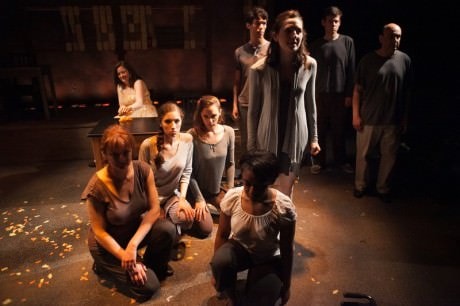
A Bid to Save the World is performed as a part of the Source Festival – Mortality: Full- length play, which is playing on June 22, 2014 at 1:00 PM and 8:00 PM, and June 27, 2014 at 9:00 PM at THE SOURCE THEATRE FESTIVAL 2014 (June 7 – June 29, 2014) at Source– 1835 14th Street. NW, in Washington, DC. For tickets, call OvationTix customer service toll-free: (866) 811-4111, or purchase them online. Source is located 2 Blocks from U Street/Cardozo Metro Station on the Yellow & Green Lines.
LINKS:
Erin Bregman’s website
Reviews of Shows
A Bid to Save the World (Anne Tsang)
Countdown (Sophia Howes)
‘Dontrell, Who Kissed The Sea (Justin Schneider)
Mortality (Anne Tsang)
Revenge-Six 10-Minute Plays. (Anne Tsang)
The Thrush and the Woodpecker (Robert Montenegro)
We Forget, We Never Forget (Justin Schneider)
___
The Playwright’s Playground by Sydney-Chanele Dawkins
The Playwright’s Playground: SOURCE Festival 2014 – An Interview with Playwright A.K. Forbes on Her Play: ‘Collateral Damage and Other Cosmic Consequences.’
The Playwright’s Playground: SOURCE Festival 2014 – An Interview With CJ Ehrlich on Her Play ‘Picnic on the Lake.’
The Playwright’s Playground: SOURCE Festival 2014 – An Interview with Playwright Susan Goodell on Her Play: ‘After Unlocking the Universe.’
The Playwright’s Playground: SOURCE Festival 2014 – Interview with Playwright Elizabeth Archer on Her Play: ‘Old Gray Devil.’
The Playwright’s Playground: SOURCE Festival 2014 – Interview with Playwright Molly Hagan on Her Play: ‘The Wild Ones’
The Playwright’s Playground: SOURCE Festival 2014 – Interview with Playwright Marine Gassier on Her Play: ‘The Reluctant Genie of Niamey.
The Playwright’s Playground: SOURCE Festival 2014 – Interview with Playwright Erin Bregman on Her Play: ‘A Bid to Save the World.’


